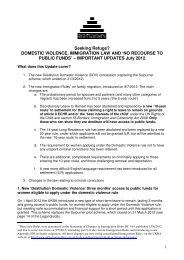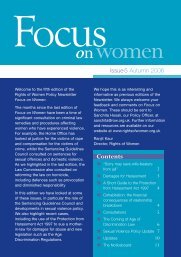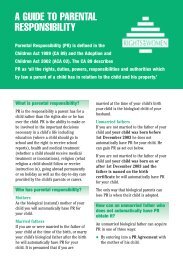Seeking Refuge? - Rights of Women
Seeking Refuge? - Rights of Women
Seeking Refuge? - Rights of Women
You also want an ePaper? Increase the reach of your titles
YUMPU automatically turns print PDFs into web optimized ePapers that Google loves.
The process <strong>of</strong> deciding the appeal is the same,<br />
whether or not a person is represented. This<br />
means that you will usually start the appeal<br />
hearing by explaining why you need protection in<br />
the UK. Once you have done this, you will be<br />
cross-examined (see above) by the Home Office<br />
Presenting Officer. You can then call any witnesses<br />
that you have and ask them questions. They will<br />
then be cross-examined. The Home Office<br />
Presenting Officer will then explain why he or she<br />
thinks you should not be given protection in the<br />
UK. You will then have the opportunity to respond<br />
to this, and to explain why you think that you<br />
should be given protection in the UK.<br />
It is very important that you prepare for your<br />
appeal.<br />
You can prepare for your appeal by:<br />
• Thinking about what you want to say in your<br />
evidence. You can write yourself notes, or a<br />
timeline (a list in order <strong>of</strong> what happened to<br />
you and when it happened), to make sure that<br />
you say everything in the appeal that you need<br />
to.<br />
• Thinking about any other evidence that you<br />
have which supports what you are saying. This<br />
could be documentary evidence, such as a<br />
party membership card, or it could be<br />
information that you have about your country.<br />
You might have a witness who can confirm<br />
what you say. If you have any supporting<br />
evidence, it is important that you tell the AIT<br />
and the Home Office about it before the<br />
hearing. These are issues that should be<br />
discussed at the Case Management Hearing.<br />
• Thinking about how your case fits into the law<br />
on protection.<br />
• If you want protection in the UK from<br />
persecution or some form <strong>of</strong> serious harm in<br />
your home country, you should make sure that<br />
you explain:<br />
o Who you fear the harm from, why, what the<br />
harm is and why you fear that you,<br />
personally, are at risk.<br />
o If you fear harm from a non-State actor,<br />
whether your State is willing or able to<br />
protect you from the harm and why.<br />
o Whether there is another part <strong>of</strong> the<br />
country that you could go to that would be<br />
safe and if not, why not.<br />
You have to explain to the AIT why there is a<br />
real risk that if you were returned to your<br />
country, you would face persecution or<br />
some other form <strong>of</strong> serious harm.<br />
• If you are claiming protection in the UK, or<br />
seeking to remain in the UK, on the basis <strong>of</strong><br />
your family life, you should explain:<br />
o Who your family life is with.<br />
o Whether or not they would return to your<br />
country with you (this is particularly<br />
important when your family life is with<br />
someone who is British, or has Indefinite<br />
Leave to Remain).<br />
o What would happen to your family life if you<br />
were forced to return to your country.<br />
For detailed information about the law that<br />
determines who is entitled to protection in the<br />
UK, see Chapter 2.<br />
The decision: after the appeal<br />
The decision made by the Immigration Judge is<br />
called a determination. It is usually given in<br />
writing.<br />
In most cases, the Immigration Judge(s) will not<br />
give you a decision on your appeal on the day<br />
that your appeal is heard. Instead, they will write<br />
their determination afterwards and send it to the<br />
Home Office, who will then send it to you. In<br />
some cases, the Immigration Judge will give you a<br />
decision at the hearing and explain his or her<br />
reasons for it later, in the determination.<br />
You should seek legal advice on your determination.<br />
You can do this by discussing it with your legal<br />
representative or, if you do not have one, by<br />
contacting one <strong>of</strong> the organisations given at the<br />
end <strong>of</strong> this Chapter for advice.<br />
If the Judge allows your appeal, you may be given<br />
protection in the UK. Depending on your case,<br />
you may be given <strong>Refuge</strong>e Leave,<br />
Humanitarian Protection, Discretionary Leave<br />
or Indefinite Leave to Remain in the UK. For<br />
information about positive decisions and the<br />
rights that you have, see Chapter 7.<br />
However, if the Judge allows your appeal the<br />
Home Office may then appeal against the<br />
decision. If the Home Office decides to challenge<br />
the determination <strong>of</strong> the AIT, it must tell you<br />
about it at the same time that they give you the<br />
determination.<br />
53
















